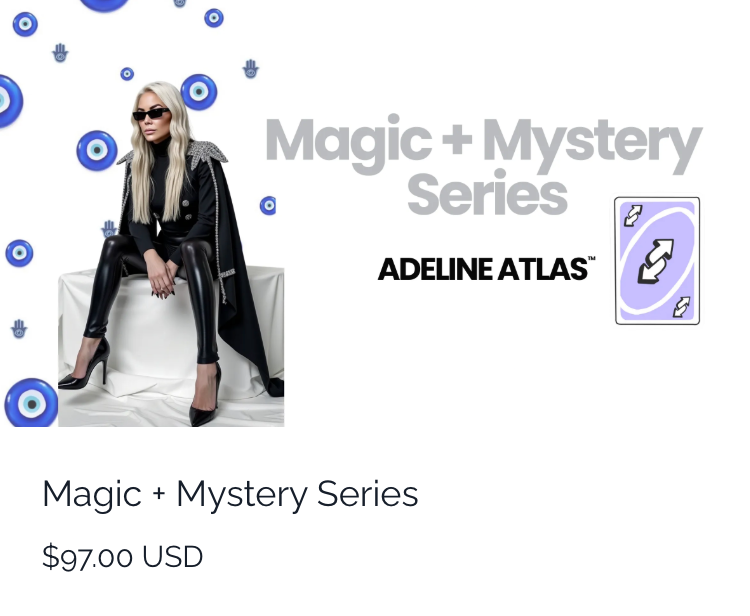The DNA Ponzi Scheme — How You Paid to Be Mined By By Adeline Atlas
Jun 20, 2025
Biometric Bondage series: where we learn how anatomy is being linked to authentication in the AI era. I’m Adeline Atlas, 11-time published author, and in today’s video, we’re pulling the curtain back on what may be the most elegant con of the biometric era. You paid them to take your DNA—and they sold it. Your bloodline, your ancestry, your health risks, your family’s genetic code—it’s all been packaged, monetized, and in some cases, auctioned off in corporate bankruptcy proceedings. This is the DNA Ponzi scheme. And the terrifying part? You entered it willingly.
Let’s start with the pitch you saw. “Discover your roots.” “Learn your ethnic breakdown.” “Get personalized health reports.” Services like 23andMe, AncestryDNA, MyHeritage, and others promised insights into your past and a roadmap for your future. All it took was a saliva sample. And tens of millions of people mailed them in.
But what you didn’t fully see—buried in the fine print—was this: your data would be stored indefinitely. Shared with “research partners.” Aggregated with others. Possibly sold in the event of company acquisition. And when you clicked “agree,” you didn’t just share your story. You handed over your biological code. The most intimate form of data imaginable.
Let’s put some numbers on this. As of 2023, over 40 million people had submitted their DNA to major commercial databases. 23andMe alone held genetic profiles on more than 13 million individuals before it imploded. And Ancestry.com, after being acquired by private equity giant Blackstone for $4.7 billion, became the owner of what may be the single largest private collection of human genetic data in the world.
Now ask yourself—what’s more valuable: a list of surnames, or an unchangeable digital map of your body and its vulnerabilities?
Because here’s the truth: these companies weren’t built for discovery. They were built for data. Your data. They’ve struck deals with pharmaceutical companies, research labs, and biotech investors. 23andMe partnered with GlaxoSmithKline in a $300 million agreement to use your DNA for drug development. And what did you get? A pie chart of your supposed Irish ancestry and a vague warning about “increased risk for Alzheimer’s.” That’s not empowerment. That’s exploitation masked as novelty.
Now let’s talk about the collapse. In 2023, 23andMe suffered a massive data breach—nearly 7 million users’ profiles, including names, ethnicities, birth years, and genealogical links were leaked. But the real scandal wasn’t just the breach—it was the business model that came after. By early 2025, after mass resignations, class-action lawsuits, and plummeting public trust, 23andMe filed for Chapter 11 bankruptcy. And what did it try to sell off? You guessed it—the database. Your DNA.
It turns out, in the event of bankruptcy, genetic data is considered a corporate asset. Not sacred. Not private. Just another commodity on the balance sheet. And while the company issued reassurances that privacy agreements would be honored, there’s a catch: many of those agreements included vague clauses about “business transfer events.” That means that if a new owner complies with the same vague policy—you have no say in how your DNA is used.
Now imagine your genome—your literal biological fingerprint—being sold to third-party data brokers, insurance underwriters, or governments. There’s no undoing that. Unlike a leaked credit card or email address, your DNA can’t be changed. It can’t be revoked. Once it’s out there, it’s out there forever.
This is the con: you paid them. You funded the infrastructure that extracted and commodified your identity. You paid for the kit, they took your spit, and then they sold your double helix to the highest bidder.
Let’s go further. What happens when this data is combined with your online activity? Your wearable health data? Your shopping history? Your voice profile from Alexa or Google Assistant? This isn’t just about DNA. This is about total biometric convergence. The body as the database. The genome as the gateway. And the customer—you—unknowingly building the prison you’ll never escape.
Now let’s look at Ancestry.com, which was acquired by Blackstone—the same private equity firm with deep ties to real estate, pharma, defense, and predictive analytics. They didn’t just buy a genealogy company. They bought a bloodline map. Over 20 million users’ DNA, charted into family trees, linked to geographic movement patterns, and connected to living descendants. That’s not just data. That’s infrastructure for population-level modeling, insurance risk calculation, and possibly even genetic social credit systems in the future.
Why would a trillion-dollar asset manager want your grandma’s saliva sample?
Because in a world where data is gold, DNA is platinum. It predicts health. It predicts behavior. It holds ancestral trauma markers. It shows immunity trends. It maps out who you’re related to—and who might be eligible for what. Think deeper: What if governments begin assigning benefits, liabilities, or even reparations based on genetic ancestry instead of census declarations? What if your DNA determines your medical premiums, legal status, or criminal risk score?
Sound dystopian? It’s already in motion. In China, reports emerged that the state was collecting Uighur DNA to build ethnic-based tracking systems. In the U.S., police departments have scraped DNA profiles from public ancestry databases to solve cold cases—sometimes without warrants, often without your knowledge. And if you uploaded your data to a third-party tool like GEDmatch, your genetic blueprint might be already linked to a criminal case involving someone you’ve never met.
This is the new reality: biological proximity = digital exposure.
You don’t even have to submit your DNA to be surveilled. If a cousin did, you can be inferred. Investigators, marketers, and insurance companies can build predictive models of you based on others in your lineage. You are guilty by genomic association.
And the legal protections? Virtually nonexistent. In the U.S., no comprehensive federal law governs how commercial DNA can be stored, shared, or sold. HIPAA doesn’t apply if the data isn’t collected in a clinical setting. And once anonymized—even if it can easily be re-identified—it’s fair game. This legal gray zone allows companies to build massive DNA warehouses and operate with near impunity.
Let’s pause here and ask: what have we learned?
You paid for the test. You gave your biology. You got a digital report. And they got a product so valuable it’s now at the center of corporate buyouts, national security strategies, and predictive surveillance empires.
That’s the DNA Ponzi scheme.
It’s not just about selling you the illusion of self-discovery. It’s about making you fund your own biometric enslavement.
And now, we’re entering the next phase. DNA isn’t just being stored. It’s being used to train AI. Companies are creating genomic-based health predictors, personality models, even AI-generated embryos tailored to desired traits. You are not just the subject. You are the training data. Your body—the teacher. Your children—the product.
It’s no longer a question of “if” this information will be used. It’s a question of how far it will go.
And so, the most important question is: Do you know where your DNA is?
Because if you don’t, it might already belong to someone else.
And they’re not using it to find your ancestors.
They’re using it to design your future—without asking for your consent.
That is the biometric trap. That is the price of curiosity in the era of data mining. And that is why we call this the Ponzi scheme of identity—because you were promised connection. But what you got was extraction.
And now, your bloodline isn’t just yours anymore. It’s a product.
Packaged. Priced. And permanently out of your hands.















